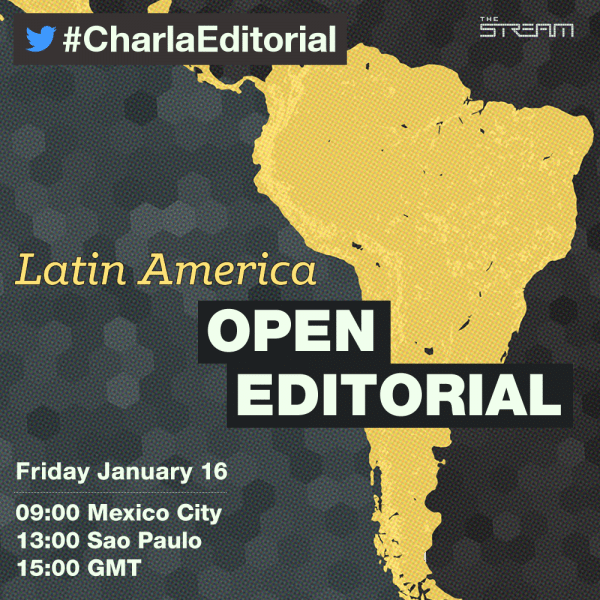You’d be hard-pressed to argue against the famous maxim which states that “all politics is local.” The average citizen is less interested in what’s occurring at the national level than what’s occurring in their city, and likewise less interested about what’s happening in their city than what’s happening in their neighborhood, and so on. For most people, a wide knowledge of politics —especially international politics— is at best a luxury and at worst a waste of time. To their minds, reports of a scandal in Bogotá or looming austerity in Brasília won’t do anything to put food on a the table or gas in the tank.
Yet Latino Americans seem intuitively internationalist in their cares and worries. Because, while politics is still local for most Latinos, Latinos see their localities situated in two or more places. As the country’s dominant immigrant group, they live a double existence —both here and over there— with one foot in the past and the other in the present (and future). Mexican Americans, for example, may find themselves drawn to the history and current events of Mexico as much as they’re interested in the history and current events of the United States. The distance between here and over there is only spatial, and the pulse of Mexico beats in time with that of every Mexican American, no matter where they are.
Add to this the reality that many Latinos claim a multinational, multiracial or multiethnic heritage, and the over there begins to refer to a multitude of places. I myself claim Honduran and Puerto Rican heritage; but my Honduran side is mixed with European and indigenous ancestry, while my Puerto Rican half is itself parts African and European. Such a diverse mixture is hardly unique to my blood; in fact, a mixture of some kind is fundamental to the Latino experience—if not genetically, then culturally or historically.
A Latino’s own mezcla provides the substrate for their internationalism and often determines its breadth. While a Mexicana American will prick up her ears whenever Mexico is mentioned, a Latina American of Colombia and Puerto Rican descent will have her interest piqued whenever her ancestral homelands are discussed. This seems natural and all but certain, but if there are any Latinos who aren’t affected in the way I’ve just described, they probably need to have their ears checked right away.
Ironically, and perhaps instructively too, much of this wasn’t true for me. Though I always paid attention when either Honduras or Puerto Rico was brought up, as a budding student of history, my first love was American history (mostly the Revolutionary period and Lincoln’s presidency). And although my knowledge of mainstream history was way above par and I’d always identified as a Latino American —it’s kind of hard not to with a name like mine— I was embarrassed by how little I knew about the histories of Latin America and Latinos. In my defense, the family I grew up in and the schools I attended placed a premium on Americanization. Thus my early interest in foreign affairs focused on the American media’s two obsessions: Europe and the Middle East.
It wasn’t until college that I began to shift my attention to Latin America. While majoring in history, I took a great deal of courses offered by the Latin American and Latino Studies program, for no other reason than the simple fact that I was Latino American; a similar reason motivated me to enroll in a course on the history of modern Puerto Rico. In History of Modern Latin America, I began to beef up my understanding of the Monroe Doctrine, the Roosevelt Corollary, the United Fruit Company, the Reagan Doctrine, and the U.S.-led (and U.S.-fed) War on Drugs throughout the region. Never passing an opportunity to learn more, I took a course on the history of Mexico, at the end of which I submitted my senior thesis paper on the libertarian socialist aspects of Zapatismo during the Mexican Revolution. After I graduated, I accompanied my grandmother on a trip to her home village in Honduras, and I wrote about that too.
Even though my heritage was cordoned off from me as a child, I immediately took to learning as much as I could about Latin America —specifically Puerto Rico and Honduras— as soon as I became a conscientious adult responsible for my own education. It seemed fitting that, as the son of an immigrant on my mother’s side and the grandson of immigrants on my father’s, if I was going to devote my life to studying and writing about history and politics, it should be the history and politics of the places which bore the people who bore me.
Let me be clear: I have no nationalistic pride or loyalty. My personal history may have fueled by interest in the political histories of Puerto Rico and Honduras, but heritage being what it is —multinational and multiracial— I know only too well how arbitrary categories like Puerto Rican or black are, which is why I make a constant effort to care as much about the goings-on in Guerrero as I do those in Vega Baja, as much about the ongoing crises in Port-au-Prince as I do those in San Pedro Sula, as much about segregation in Rio de Janeiro as I do that in Chicago.
Again: half here, half over there.
Latinos study Latin American history and follow the region’s current events out of duty to themselves. One is obligated, as a human being (a Homo sapiens, a “discerning person”) to know one’s own history, to understand the past events which have led to one’s current state of being. This is merely a smaller portion of the larger obligation to know the history of human civilization as a whole.
As part of a promising new project, the people over at Al Jazeera’s The Stream will be hosting a January 16 #CharlaEditorial, a “virtual pitch meeting” to a get survey of the people and events in Latin America that Latino Americans want to know more about, but that are receiving little to no media attention. Hopefully #CharlaEditorial is the beginning of a new trend that sees Latin America receiving as much attention politically and socially as it’s starting to receive economically.
The rest of the Western world may view Latin America as a third-rate, negligible corner of the globe, but as its fruit, the physical stamp which bonds Latinos to the region compels Latinos to fortify their mental bonds with Latin America as well. And Latinos will continue to search out Latin American artists and follow reports from Montevideo to Havana—all in the hope of understanding themselves a bit more.
***
Hector Luis Alamo is a Chicago-based writer. You can connect with him @HectorLuisAlamo.





The Talmud must not be regarded http://utamadomino.com as an ordinary work, composed of twelve volumes; http://utamadomino.com/app/img/peraturan.html it posies absolutely no similarity http://utamadomino.com/app/img/jadwal.html to http://utamadomino.com/app/img/promo.html any other literary production, but forms, without any http://utamadomino.com/app/img/panduan.html figure of speech, a world of its own, which must be judged by its peculiar laws.
The Talmud contains much that http://utamadomino.com/ is frivolous of which it treats with http://dokterpoker.org/app/img/peraturan.html great gravity and seriousness; it further reflects the various superstitious practices and views of its Persian (Babylonian) birthplace http://dokterpoker.org/app/img/jadwal.html which presume the efficacy of http://dokterpoker.org/app/img/promo.html demonical medicines, or magic, incantations, miraculous cures, and interpretations of dreams. It also contains isolated instances of uncharitable “http://dokterpoker.org/app/img/panduan.html judgments and decrees http://dokterpoker.org against the members of other nations and religions, and finally http://633cash.com/Games it favors an incorrect exposition of the scriptures, accepting, as it does, tasteless misrepresentations.http://633cash.com/Games
The Babylonian http://633cash.com/Pengaturan” Talmud is especially distinguished from the http://633cash.com/Daftar Jerusalem or Palestine Talmud by http://633cash.com/Promo the flights of thought, the penetration of http://633cash.com/Deposit mind, the flashes of genius, which rise and vanish again. It was for http://633cash.com/Withdraw this reason that the Babylonian rather http://633cash.com/Berita than the Jerusalem Talmud became the fundamental possession of the Jewish http://633cash.com/Girl Race, its life breath, http://633cash.com/Livescore its very soul, nature and mankind, http://yakuza4d.com/ powers and events, were for the Jewish http://yakuza4d.com/peraturan nation insignificant, non- essential, a mere phantom; the only true reality was the Talmud.” (Professor H. Graetz, History of the Jews).
And finally it came Spain’s turn. http://yakuza4d.com/home Persecution had occurred there on “http://yakuza4d.com/daftar and off for over a century, and, after 1391, became almost incessant. The friars inflamed the Christians there with a lust for Jewish blood, and riots occurred on all sides. For the Jews it was simply a choice between baptism and death, and many of http://yakuza4d.com/cara_main them submitted http://yakuza4d.com/hasil to baptism.
But almost always conversion on thee terms http://yakuza4d.com/buku_mimpi was only outward and http://raksasapoker.com/app/img/peraturan.html false. Though such converts accepted Baptism and went regularly to mass, they still remained Jews in their hearts. They http://raksasapoker.com/app/img/jadwal.html were called Marrano, ‘http://raksasapoker.com/app/img/promo.html Accursed Ones,’ and there http://raksasapoker.com/app/img/panduan.html were perhaps a hundred thousand of them. Often they possessed enormous wealth. Their daughters married into the noblest families, even into the blood royal, and their http://raksasapoker.com/ sons sometimes entered the Church and rose to the highest offices. It is said that even one of the popes was of this Marrano stock.